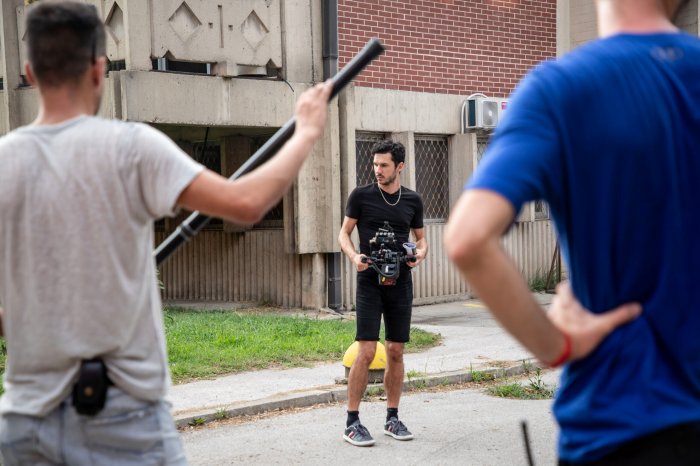BY DAVID NOH | Katharine Houghton, Katharine Hepburn's niece, wants to make it clear: “Kate and Spencer Tracy were rampantly… heterosexual.” William J. Mann's recent biography “Kate: The Woman Who Was Hepburn” made serious assertions to the contrary about both stars' sexuality, but Houghton scoffed, “That's just hilarious. If I ever knew a man who was heterosexual, it was Spencer — nothing against people being whatever they want to be, but come on! And Kate was very hetero. She had many more love affairs with men than anybody has ever known, quite active in her early days but in all honesty I think sex meant power to her. She never fell in love with a man who wasn't rich and powerful who could help her career. There was a methodology.”
Houghton has recently been honoring both her aunt and the donation of Hepburn's theatrical papers to Lincoln Center Library of the Performing Arts with a series of special performances. Any Hepburn fanatic worth his salt would have been thrilled to be at the Library this spring when Anthony Harvey recalled the actress tossing his initial gift of a bouquet into the fire and how he forced her to do the famous mirror scene in “A Lion in Winter,” “to show her vulnerability,” which won her her third Oscar.
Hepburn's niece recalls the legend up close.
Houghton and Charlotte Moore read delightful excerpts from a journal Hepburn kept during her first national tour of “As You Like It,” in which she meticulously noted the condition of every dressing room and toilet facility in theaters nationwide. And Dick Cavett played mischievous Puck to a hilariously disdainful Marian Seldes, especially when he remembered confronting Fred Astaire with Hepburn's famous quote: “He gives Ginger Rogers class and she gives him sex.” They were sitting in a limo and Astaire, who'd never heard the remark, exploded, “What the hell did she mean? I've never heard of anything so stupid! Is she saying I'm a fag?” The car windows were down and a fan passing by got the jolt of her life when she saw Astaire yell, “Katharine Hepburn is full of shit!”
Seldes remarked about Houghton, “She knows everything about her aunt but will say nothing,” but Hepburn's niece was remarkably candid in a fascinating recent interview when she told me, “I think Kate died just at the right time because the world that she was born into, and became a star in, is gone and the kind of democracy we have nowadays would not have appealed to her.
“She really lived a very privileged life, which doesn't exist anymore and you can't even have it with money. Everybody who flies in an airplane now has to go through the same kind of idiotic security measures, but she would have refused to do that, which meant she couldn't fly. A lot of things that were part of the freedom of existence that she enjoyed have just gone. She would have hated it, having known that other life.”
Houghton played Hepburn's daughter in “Guess Who's Coming to Dinner,” but wasn't thrilled with the role because it was so vapid and different from whom she really was. She begged director Stanley Kramer to retain a scene in which her seemingly bubble-headed character shows some smarts and confronts her father with his racism, but “Stanley Kramer said, 'You don't understand America. A lot of people will be upset by this film and if you appear to be an intelligent, articulate young woman who knows what she's getting in for, you're not going to be sympathetic.'
“I said, 'I couldn't disagree with you more. People are going to hate me because I'm a cipher and they're going to say why would a man like Sidney Poitier fall in love with a girl like that? It's more racist that you make me a cipher because you're saying that my being white and pretty is enough and it isn't.'”
The scene was cut, with the result that “people in Hollywood thought that that was what I was like, so the parts I got offered were idiotic. I thought, 'I'm dead in this town,' and returned East to the theater.”
Houghton feels the film's strength lies in the Hepburn-Tracy relationship but “it was hard because he was dying so I was seeing the end of that love affair. They were very well suited and I think when he died she really began to fall apart. It took a long time for her psychological power to crumble, but he was so important to her as a balance in her nature. In the same way that a child needs a parent around to have parameters or a dog needs a trainer, he provided boundaries for her that were very necessary.
“She could be very perverse and disagreeable, but Spence never let her get away with that, which must have been a relief to her. Those traits were never controlled in her so it was an amusing personality trait – that kind of control freak personality may get a lot done, but, especially as she got older, that became her own worst enemy. To a certain extent it's being spoiled, and as long as Spence was around she couldn't go full throttle in that headstrong, destructive direction.
“When he was no longer around, I'm afraid that particular element of her personality became more dominant and I think it made her very unhappy because it isn't fun for other people to be around that. One by one her friends began to drop away. People don't want to be around that kind of abuse. In many ways, she really wasted the last 20 years of her life.”
The Tracy affair endured, however, through many challenges, like his drinking and dalliances: “There was Ingrid Bergman. She was very jealous of Ingrid, would call her a cow, and Spencer and I would look at each other, roll our eyes, and say, 'Uh-huh, we know where that's coming from!' I mean how could you not be jealous of Ingrid Bergman — she was perfection!
“There was Gene Tierney, too, but then there were times when he would drink and she'd say, 'I cannot stand it. You've got to stop or I'm going to leave you.' That was the biggest strain, so she left to do her Shakespeare tour and thought it was really over, but the amazing thing is they got back together so it showed the relationship had real substance.”
During “Guess,” Hepburn was a total control freak, forcing Houghton to gain 20 pounds, “fattening me up like a Strasbourg goose because she thought at 99 pounds, I looked like a prison camp survivor. I hate the way I look in the film. She didn't want me to go anywhere, and I was expected to be at Spencer's house every night for supper. Some friends invited me to a party in Pacific Palisades and when I told her I was going, she got absolutely furious and said, 'How can you do this? Spence will never speak to you again!' It was because she knew that he was on his way out and any derivation from her schedule just made her go crazy.'”
Houghton did go to a dinner at director George Cukor's house: “Kate said, 'I'll only take you if you put up your hair. I said, 'Fine, you do it because I don't wear my hair that way.' She cranked it back and twisted it on top of my head. Tallulah Bankhead was sitting across me and kept staring at me like I was a painting or a sculpture – something was obviously wrong. She finally got up, came around the table, stood in back of me, and took all the pins out of my hair, saying, 'Dahling, you shouldn't wear your hair like that' — and I'm looking at Kate, sitting at George's left — 'you look like a New England schoolteacher.'”
Hepburn's last years, Houghton said, “were not the scenario we would have written. To grow old in a creative way takes an enormous amount of character, but it isn't easy. People who haven't been terribly spoiled can do it better than those who have because they've had to develop backbone and character along the way, but when you've had pretty much everything go your way and then all of a sudden it's different then it's extremely difficult to reinvent yourself and find the magic of life. She was always so strong and physically active, had never been ill, and when her body began to sabotage her it was such a shock.”
Houghton admires Cate Blanchett, but of her Hepburn impersonation in “The Aviator,” she said, “There isn't anybody that can really play Kate. What happens is inevitably a caricature and that whole movie was so stupid, anyway, because of the way they presented my family, so idiotically. They used the family from 'The Philadelphia Story,' which had nothing to do with us — we never lived in houses like that and my grandparents were not snobs who came from money.
“My grandfather had no money and came from a Southern family that had been ruined in the Civil War. Any dime he had, he earned himself so when Howard Hughes says, 'Well, if you had to earn your own money…' I felt like throwing something at the screen. Howard Hughes was born to money. He spent $28 million making 'Hell's Angels!' My grandfather was a self-made man who never had that kind of money.”

































